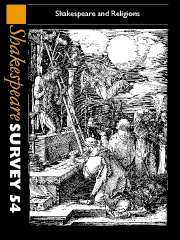Book contents
- Frontmatter
- Shakespeare and the Protestant Mind
- Divine [ ]sences
- ‘An alien people clutching their Gods’?: Shakespeare’s Ancient Religions
- ‘He drew the Liturgy, and framed the rites’: The Changing Role of Religious Disposition in Shakespeare's Reception
- Jonson, Shakespeare, and the Religion of Players
- The Bard and Ireland: Shakespeare’s Protestantism as Politics in Disguise
- ‘Every Good Gift From Above’ Archbishop Trench’s Tercentenary Sermon
- Anthony Munday and The Merchant of Venice
- Perfect Answers: Religious Inquisition, Falstaffian Wit
- When Suicide Becomes an Act of Honour: Julius Caesar and Hamlet in Late Nineteenth-Century Japan
- Religion in Arden
- A Wedding and Four Funerals: Conjunction and Commemoration in Hamlet
- Between Religion and Ideology: Some Russian Hamlets of the Twentieth Century
- Of Shadows and Stones: Revering and Translating ‘the Word’ Shakespeare in Mexico
- Ministers, Magistrates and the Production of ‘Order’ in Measure for Measure
- The Hebrew Who Turned Christian: The First Translator of Shakespeare into the Holy Tongue
- Shakespeare and English Performance Style: The European Context
- All At Sea: Water, Syntax, and Character Dissolution in Shakespeare
- King John, König Johann: War and Peace
- The Tempest’s Forgotten Exile
- The Old Lady, or All is Not True
- Shakespeare Performances in England, 2000
- Professional Shakespeare Productions in the British Isles January-December 1999
- The Year's Contributions to Shakespearian Study 1 Critical Studies
- 2 Shakespeare’s Life, Times, and Stage
- 3 Editions and Textual Studies
- Books Received
- Index
Jonson, Shakespeare, and the Religion of Players
Published online by Cambridge University Press: 28 March 2007
- Frontmatter
- Shakespeare and the Protestant Mind
- Divine [ ]sences
- ‘An alien people clutching their Gods’?: Shakespeare’s Ancient Religions
- ‘He drew the Liturgy, and framed the rites’: The Changing Role of Religious Disposition in Shakespeare's Reception
- Jonson, Shakespeare, and the Religion of Players
- The Bard and Ireland: Shakespeare’s Protestantism as Politics in Disguise
- ‘Every Good Gift From Above’ Archbishop Trench’s Tercentenary Sermon
- Anthony Munday and The Merchant of Venice
- Perfect Answers: Religious Inquisition, Falstaffian Wit
- When Suicide Becomes an Act of Honour: Julius Caesar and Hamlet in Late Nineteenth-Century Japan
- Religion in Arden
- A Wedding and Four Funerals: Conjunction and Commemoration in Hamlet
- Between Religion and Ideology: Some Russian Hamlets of the Twentieth Century
- Of Shadows and Stones: Revering and Translating ‘the Word’ Shakespeare in Mexico
- Ministers, Magistrates and the Production of ‘Order’ in Measure for Measure
- The Hebrew Who Turned Christian: The First Translator of Shakespeare into the Holy Tongue
- Shakespeare and English Performance Style: The European Context
- All At Sea: Water, Syntax, and Character Dissolution in Shakespeare
- King John, König Johann: War and Peace
- The Tempest’s Forgotten Exile
- The Old Lady, or All is Not True
- Shakespeare Performances in England, 2000
- Professional Shakespeare Productions in the British Isles January-December 1999
- The Year's Contributions to Shakespearian Study 1 Critical Studies
- 2 Shakespeare’s Life, Times, and Stage
- 3 Editions and Textual Studies
- Books Received
- Index
Summary
Scholars typically characterize the theatre of Shakespeare’s England as a secular stage, and they have good reasons for doing so. By the time Shakespeare began to write plays, the biblical drama of medieval England had all but died, from causes not entirely natural. It had been censored by Protestant officials concerned with its Catholic provenance, and censorship appears to have hampered the depiction of religious material in the new public theatres as well. Moralists such as Phillip Stubbes (1583) warned England that players allowed to dramatize the word of God would inevitably contaminate ‘divinity’ with their ‘bawdy, wanton shows & uncomely gestures’. Following a brief period (1588–9) in which church and state encouraged the theatres to vilify the radical puritan ‘Martin Marprelate’ for his attacks on bishops, the authorities did indeed recoil from the spectacle of ‘divinity’ handled, in their view, ‘without judgement or decorum’; by a 1606 act of Parliament, moreover, players were forbidden to ‘speak or use the holy Name of God or of Christ Jesus, or of the Holy Ghost or of the Trinity’ profanely. Whether or not these official strictures had any chilling effect, players in Shakespeare’s day showed little interest in replacing the ‘old Church-plays’ with a biblical drama of their own.
- Type
- Chapter
- Information
- Shakespeare Survey , pp. 57 - 70Publisher: Cambridge University PressPrint publication year: 2001



